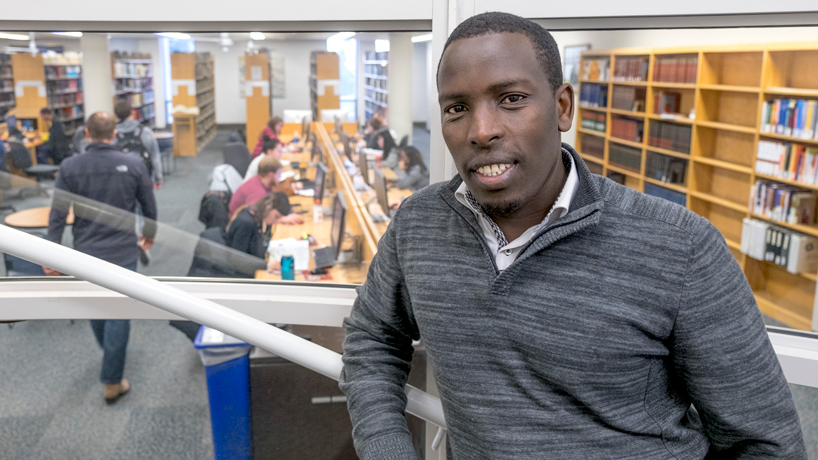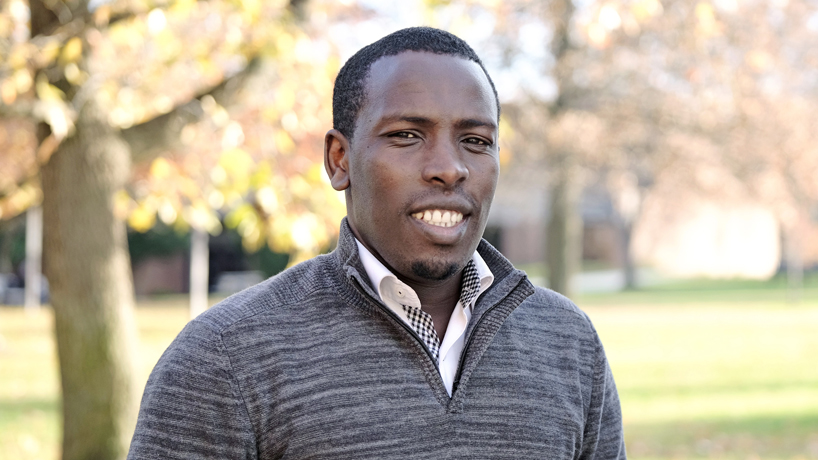
Justin Kimenyerwa is a central character in the documentary “The Last Survivor” after fleeing genocide in the Democratic Republic of the Congo and coming to the United States as a refugee. Today, he is pursuing a bachelor’s degree in international relations at UMSL and hopes to do humanitarian work. (Photos by August Jennewein)
Justin Kimenyerwa’s days are full.
When he’s not on the job as a community access worker and peer health coach at Bilingual International Assistance Services, he’s probably on campus at the University of Missouri–St. Louis, doing course work in pursuit of a bachelor’s degree in international relations. He spends whatever remaining hours he can at home with his wife, Amy, and two young daughters.
Kimenyerwa’s not complaining, though.
In fact, a penchant for complaint might be the thing he likes least about American culture.
“Americans, they have everything they need, but they still complain about little things,” he said of what he’s observed since moving to the United States in 2008. “They keep complaining about what they don’t have. They don’t get to appreciate what they have and see how much they are blessed and enjoy what they have. “
Kimenyerwa doesn’t have that problem.
He is grateful every day for the safety and security he can enjoy – while surrounded by his family – after having to flee his home in the Democratic Republic of the Congo amid civil war as a teenager. And he is all too happy to be busy pursuing education and a better future after moving first to Rwanda, then Kenya, and spending five years with his life on hold – unable to work or go to school – while living in the slums of Nairobi before getting the opportunity to come here.
“I never thought that I’d be in this great country, the United States,” he said last month during a break between classes on the top floor of the Thomas Jefferson Library. “When I found myself here, it was like a dream, because I don’t know exactly how it ended with me coming to the United States. It’s God’s miracle.”
Kimenyerwa was born into the Banyamulenge, a term historically used to refer to ethnic Tutsis concentrated on the High Plateau of South Kivu. It is located in the eastern part of the Democratic Republic of the Congo, near the borders with Burundi and Rwanda. He was raised in a village in Minembwe, near the city of Uvira on the north edge of Lake Tanganyika.
Fighting spilled over from Rwanda in 1996. Members of the Hutu, some responsible for perpetrating genocide in that country, moved into the Congo fearing retribution from the Rwandan Patriotic Front after the ouster of the Hutu government. They began launching attacks from refugee camps against Tutsi and Banyamulenge in the Congo.
Kimenyerwa and his family had spent roughly two years living in fear that their village could be next when it finally happened.
“I just remember my dad screaming that we have been attacked, so we just have to run, run away,” said Kimenyerwa, whose life was forever changed in that instant as he ran for cover in the bush.
His is one of the stories told in the award-winning 2010 documentary “The Last Survivor,” which spotlights four survivors of genocide – from the Holocaust to Darfur, Rwanda and the Congo – as they work to educate and foster a civic response to the atrocities from around the world.
The film first finds Kimenyerwa living in a corrugated medal shack in Nairobi in 2008. He had not seen his parents since his village was attacked and did not know if they were dead or alive. He was trying to focus on the his future, waiting for an opportunity to live freely and peacefully again.
With the help of Mapendo International, now RefugePoint, he gained refugee status in the U.S. The film shows him opening his acceptance letter.
“Your application for refugee status in the United States has been conditionally approved …” Mapendo International co-founder Sasha Chanoff reads aloud over his shoulder as Kimenyerwa sits, beaming.

Justin Kimenyerwa is grateful for the opportunity he’s had to restart his life in the U.S. “When I found myself here, it was like a dream because I don’t know exactly how it ended with me coming to the United States,” he said. “It’s God’s miracle.”
Kimenyerwa had never heard of St. Louis when he found out he would be moving here, and even some of the most basic things, such as shopping in an American grocery store, were foreign to him when he arrived.
But he slowly acclimated, finding a job as a medical interpreter – he speaks seven languages, including Kinyamulenge, Kinyarwanda, Kirundi and Swahili – at Barnes-Jewish Hospital and joining the congregation at New City Fellowship in south St. Louis.
Kimenyerwa was always motivated to learn, even when school was not an option for him. After about a year in the United States, he decided to pursue higher education, enrolling in classes part time at St. Louis Community College–Forest Park with a goal of eventually transferring to a university.
“The hardest thing about being a refugee,” Darfur genocide survivor Adam Bashar says in “The Last Survivor,” “is the fact that many people can’t know what hurts you.”
Kimenyerwa related easily to that sentiment. He was still searching for a connection to his family back home while settling into his new life in the United States, and at times it made for a lonely experience.
He went back to Rwanda to get married in 2012, and it doubled as an opportunity to finally reunite with family members and friends.
He has since helped his brother and his family move to the U.S. and settle in St. Louis.
Kimenyerwa gained citizenship in the United States in 2013 and enrolled at UMSL about a year later.
He began working toward a degree in public policy administration but was among the first students to change his major to be part of the new international relations degree program, created by the Department of Political Science. It is still pending approval from the University of Missouri System and the state Coordinating Board for Higher Education.
“It’s been really wonderful,” Kimenyerwa said of his experience this semester in international relations-related courses. “It’s really good. It has opened up my mind to the view of the world, not to think in the box.”
Kimenyerwa has already started an organization, Imuhira International, with a goal of preserving Banyamulenge culture through events that bring former refugees together with other Americans. Some already have been held in Illinois, Indiana, Iowa, Missouri and Texas, and they feature traditional music, dancing and food.
He expects to graduate in December 2017, but he won’t surrender his loaded schedule. He would like to pursue master’s and doctoral degrees once he’s finished. He envisions himself one day traveling between the U.S. and Africa, doing humanitarian-type work with a nongovernmental organization.
“As long as I live, I want to contribute and help the community, the country, the world,” Kimenyerwa said, “because I’ve been in a lot of situations that I feel I should be the answer to it, the solution to it.”















